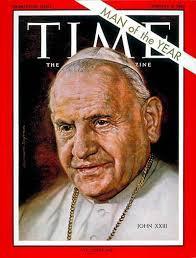
In religion news, the current pope is beatifying--awkward verb meaning: to make a saint--two of his predecessors, John Paul II and John XXIII. The latter, who was pope in the early 1960s, convened the Second Vatican Council, which dragged the Church, kicking and screaming, into the nineteenth century. If the last fifty years of reactionary policies are an indication, it was too much too fast. Masses performed in the living language of the congregants! The backlash was inevitable, and today you need not know Latin to be at least dimly aware of the Church's catholic benightedness, an expanse that blankets all matters sexual. The Church of Rome and America's Republican party may be the last two institutions in which contraception is controversial.
Edmund Wilson, who in his journals expresses exasperation with Christian theology, was an unlikely admirer of Pope John. Beset by geriatric complaints, and feeling that death was near, his journal for the 1960s includes this:
The knowledge that death is not far away, that I shall soon disappear like a puff of smoke, has the effect of making earthly affairs seem unimportant and human beings more and more ignoble. It is harder to take human life seriously, including one's own passions and achievements and efforts. In my tendency toward this state of mind, I have found Pope John fortifying. When over 80 and knowing he is doomed [by cancer], he gives all the energy left him to his council which will modernize the Church.
If Pope Francis and Edmund Wilson agree, it must be true. The case of John Paul, however, made me read closely the news articles detailing the prerequisites for becoming a saint. It seems you have to be credited, from beyond the grave, with not one but two miracles. In the case of John Paul, a French nun was cured of Parkinson's disease after praying to John Paul. The required second miracle occurred when, having prayed for relief to John Paul, a Costa Rican woman inexplicably recovered from a serious brain injury. I know it would be indelicate to speculate about the number of people who prayed for relief to John Paul only to have their diseases follow the normal course predicted by physicians. People love miracles and do not want to make it too hard to believe in them. Anyway, it most certainly is not the case that, with sainthood on the line, the Vatican accepts hearsay testimony. According to a CNN account,
Patrick Kelly, executive director of the Blessed John Paul II Shrine in Washington, explained the church's process for investigating reported miracles.
"A team of doctors first examine the miracle. Secondly, the team of theologians look at the miracles, and then they discuss amongst themselves the legitimacy and all the facts surrounding the miracles," he said.
With all that teamwork, it's hard to imagine any snafus.
